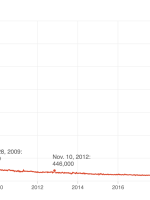Updated at 5:36 p.m. ET
Hank Paulson says the world and America are "facing a health and economic crisis unlike anything in our modern history."
Paulson knows a thing or two about a financial crisis. In 2008, as Treasury secretary, he helped steer the United States out of the worst financial crisis since the Great Depression.
He says the coronavirus crisis — which has brought much of the U.S. economy to a halt and put millions suddenly out of work — is very different from 2008, when the global financial system came close to collapsing.
This crisis "didn't begin in our financial system, which was very strong," Paulson tells NPR's Steve Inskeep. "Today, the economy is suffering because it was shut down to protect human health — having nothing to do with the underlying strength of the economy or the financial system."
Getting through it and limiting the damage to the economy will require huge tasks: containing the virus and implementing Congress's $2 trillion economic rescue package quickly, he says. That includes direct $1,200 payments to most Americans and a boost to the unemployment insurance program.
"We've got to get money moving out into the economy to the people who need it — the most vulnerable, to the small businesses, to the big businesses. And that's the big job ahead of us," Paulson says.
However, according to a memo drafted by House Democrats, people who do not have direct deposit information on file with the Internal Revenue Service may have to wait up to 20 weeks to receive cash payments
Treasury Secretary Steven Mnuchin has acknowledged it would take more time for those who didn't have addresses on file but suggested on Sunday that he expected payments to go out by mid-April.
Paulson says Mnuchin and Federal Reserve Chairman Jerome Powell have "got their work cut out for them to get this money out where it's needed."
Paulson has this additional advice for getting through the crisis: "It's vital we remember that we don't need to let fear and panic defeat us, and we shouldn't let divisiveness defeat us."
"The best-case scenario is ... we contain the virus quickly because the extent of the damage to the U.S. economy is going to be determined by how quickly we can begin to resume normal business activity in different industries in different parts of the country," he says.
The worst case, he says, is "this takes a long time. And if it takes a long time, you know what? We're still going to get through it."
Could the country see another Great Depression?
"I don't think so," Paulson says. "We have tools and knowledge we didn't have before. And I think we're a rich country and we have strong institutions and a strong history. And our government knows how to work."
Copyright 2020 NPR. To see more, visit https://www.npr.org.


